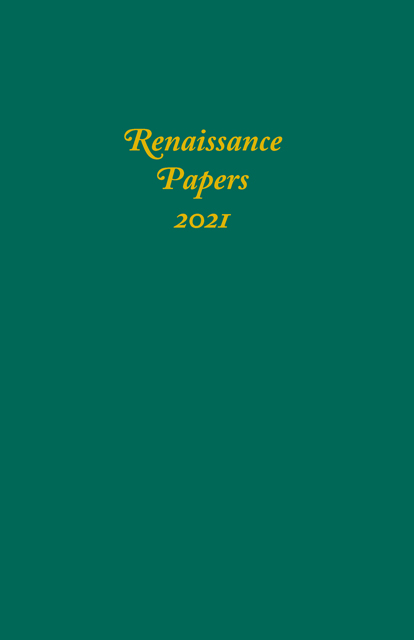Book contents
- Frontmatter
- Contents
- Dedication
- “Strange Serious Wantoning”: Early Modern Chess Manuals and the Ethics of Virtuous Subterfuge
- “Both Use and Art”: Motifs and Method in Astrophil and Stella
- Embodied Love(rs): Injury and Comedy in Mary Wroth’s Urania
- Edmund Spenser’s Automaton Alchemy: The Case of False Florimell
- Who Edited the 1571 Mirror for Magistrates?
- Statues Living and Conscious: Hermetic Statue-Magic in The Winter’s Tale
- Transmutation and Refinement: The Metaphysics of Conversion and Alchemy in Renaissance Spain
- The Twelve Inka and the Twelve Caesars: Reflections on an Early Modern Visual Theme in the Art of Colonial Peru
- Linguistics and Epistemology in Thomas Harriot’s North Atlantic World
- Assembling the King’s Body: Examining Holbein’s Portrait Techniques and the Fashioning of Henry VIII’s Image in the English Renaissance
- Molière’s L’École des Femmes between Shame and Guilt
Molière’s L’École des Femmes between Shame and Guilt
Published online by Cambridge University Press: 17 December 2022
- Frontmatter
- Contents
- Dedication
- “Strange Serious Wantoning”: Early Modern Chess Manuals and the Ethics of Virtuous Subterfuge
- “Both Use and Art”: Motifs and Method in Astrophil and Stella
- Embodied Love(rs): Injury and Comedy in Mary Wroth’s Urania
- Edmund Spenser’s Automaton Alchemy: The Case of False Florimell
- Who Edited the 1571 Mirror for Magistrates?
- Statues Living and Conscious: Hermetic Statue-Magic in The Winter’s Tale
- Transmutation and Refinement: The Metaphysics of Conversion and Alchemy in Renaissance Spain
- The Twelve Inka and the Twelve Caesars: Reflections on an Early Modern Visual Theme in the Art of Colonial Peru
- Linguistics and Epistemology in Thomas Harriot’s North Atlantic World
- Assembling the King’s Body: Examining Holbein’s Portrait Techniques and the Fashioning of Henry VIII’s Image in the English Renaissance
- Molière’s L’École des Femmes between Shame and Guilt
Summary
The emotions have long been seen as integral to dramatic theory and practice. Aristotle famously argued that the purpose of tragedy was to produce a catharsis of pity and fear. It has also been noted that comedy is ontologically predicated on a similar relation between contradictory expectations. Dana Sutton argues that one can locate the distinctive pleasure of comedic drama in an alternative model of catharsis which also seeks the purgation of negative emotions. More precisely, according to Paul Woodruff, the “paradox of comedy” is that “as theatre, it depends on engaging emotions in the audience for what it shows on stage; but, as comedy, it aims at laughter or at a response with a similar effect, disengaging its audience emotionally from what it presents.” Comedy must keep viewers emotionally invested in its characters and yet sufficiently detached from them in order to make laughter possible.
The central thesis of this paper is that the categories of shame and guilt cultures theorized in cultural anthropology can elucidate the system of characters in Molière’s L’École des Femmes (1662) and the ambivalences of its ethics of laughter. In what follows, I argue that just as these polarities may enrich our understanding of the play, this particular play has a special heuristic value insofar as it can, in turn, illuminate certain aspects of this interpretative methodology itself when both perspectives are placed in a mutually enriching dialogue. With this approach, I hope to show that in reading the play through the lenses of shame and guilt, affective structures can be especially helpful when it comes to solving, at least, one of the critical cruxes posed by the play’s ambiguous ending. As Andrew Calder notes, the final scenes provoke ambivalent emotional reactions:
Our strongest feelings are of pleasure that Arnolphe’s hubristic and harmful domination of Agnès has come to an end; he deserved to be punished and we are pleased to see it occur. Mixed with this pleasure, however, is a feeling of waste which, following some performances, can almost amount to pity. Arnolphe may be unjust and unreasonable, but he is profoundly human, and we cannot leave the theatre with a sense that all is well with the world when the life of the character who has interested us most is in ruins.
- Type
- Chapter
- Information
- Renaissance Papers 2021 , pp. 145 - 161Publisher: Boydell & BrewerPrint publication year: 2022

